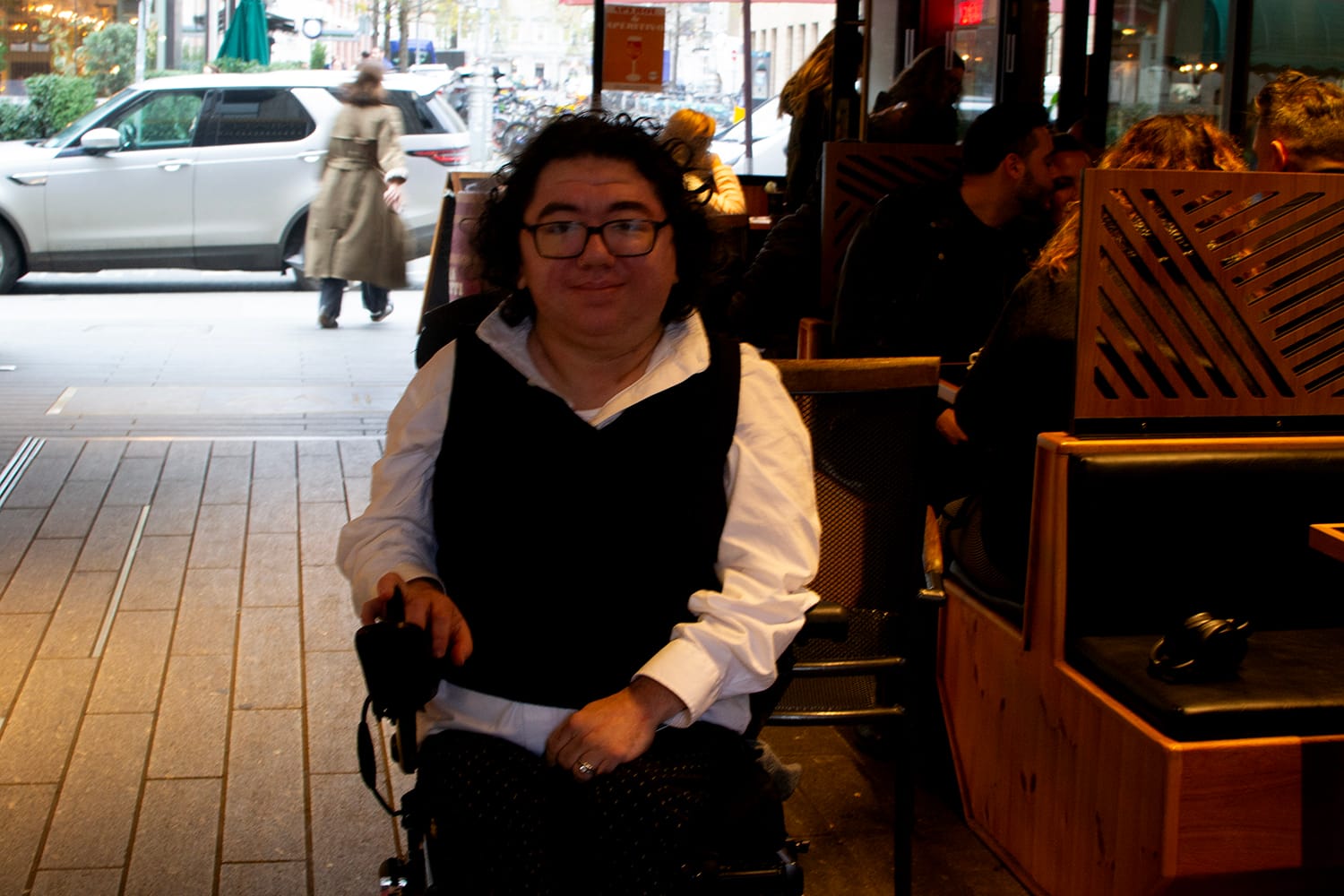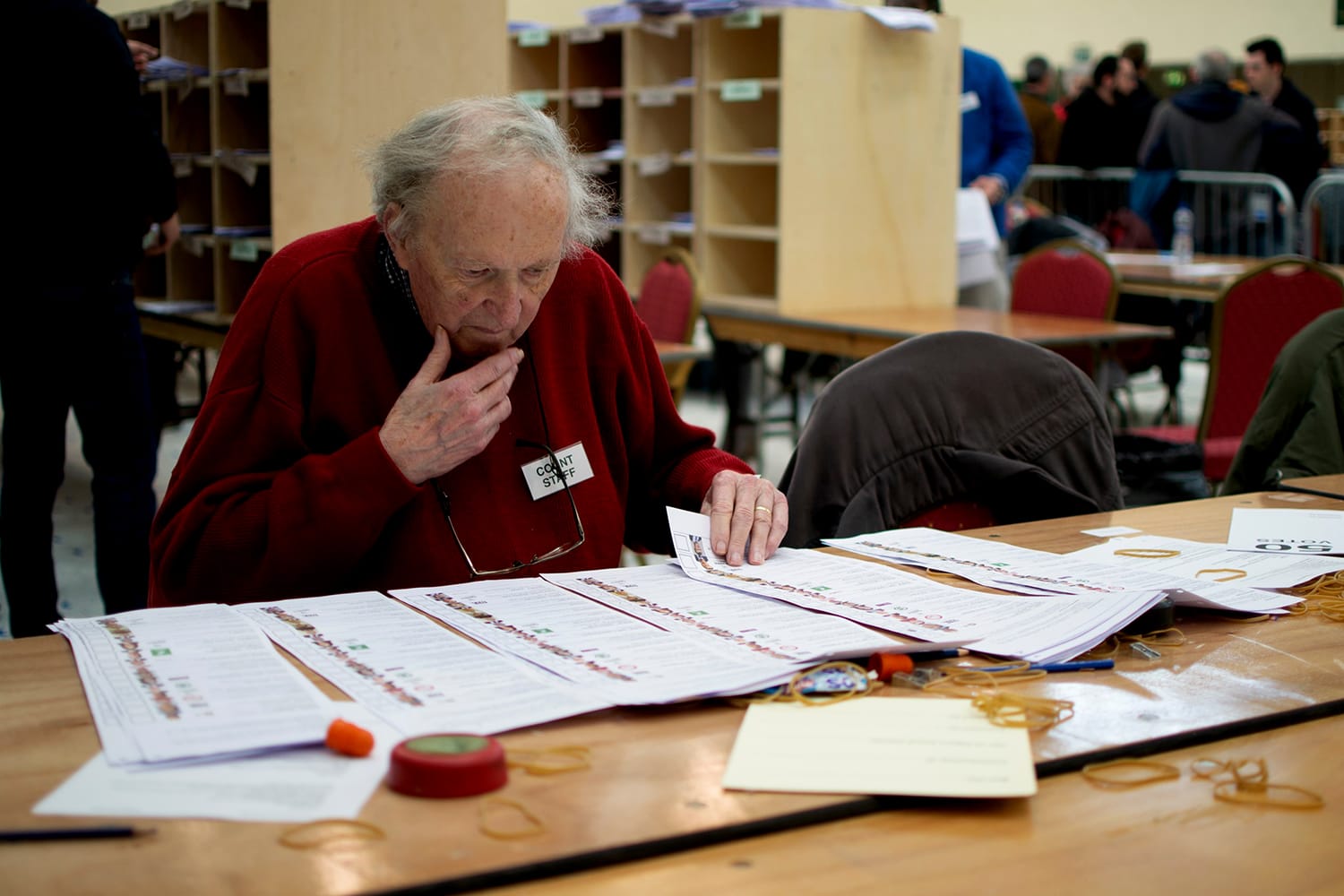What’s the best way to tell area residents about plans for a new asylum shelter nearby?
The government should tell communities directly about plans for new asylum shelters, some activists and politicians say.

Padhraic Dormer votes in every election. “If you don’t vote, you can’t give out,” he said on Friday, chuckling.
He needs a bit of help, though.
He is a wheelchair user, and also can’t hold a pen to fill out the ballot form, said Dormer, who also works as a national virtual service support worker at Enable Ireland, a non-profit that provides services for people with disabilities.
Changes under the Electoral Reform Act 2022 – which replaced an older law from 1997 – do make it easier in some ways for the hundreds of thousands of people in Ireland with disabilities to vote.
The new law made it possible for people with mental or physical illness to use flexible voting methods, which was a welcome change, says Ciarán Finlay, senior policy and public affairs advisor with the National Disability Authority (NDA).
Blind and visually impaired people can now use tactile ballot papers. Also, the number of polling stations accessible to wheelchair users has increased.
But despite progress, those with disabilities still face barriers to voting that those without don’t.
A recent review of a sample of polling stations by the Electoral Commission found that a quarter had entrances that still weren’t easily accessible.
And a discriminatory clause still in place allows supervising officers to turn away a disabled voter who needs help, if they arrive during the two hours before polls close, says Finlay.
“Our view is that this provision impedes the right to vote for those voters who require assistance,” he said. The NDA wants that erased from the law, Finlay says.
In March, Darragh O’Brien TD, the Fianna Fáil minister for Housing and Local Government, told the Dáil that that part of the law was a “long standing feature of electoral law”.
However, his department has advised presiding officers not to turn away latecomers unless it’s “absolutely necessary”, said O’Brien.
Joseph Burke, Dublin City’s sheriff, said in an email that since his appointment in December 2018, he’s done his best to ensure that polling places and count centres were accessible for everyone.
“I have never permitted a voter to be turned away if they turn up within the last two hours to vote even though the power exists,” he said.
Anyone who needs aid or has any other queries can contact him by email and phone number listed on the website.
Like other people living with a disability, Dormer, who works at Enable Ireland, has faced his share of difficulties taking part in elections.
He has had to wait to grab the attention of a returning officer to help him vote.
About five years ago, he had difficulty getting in and out of the polling station, a local school in Churchtown, with his wheelchair.
“There was a step. Obviously, I couldn’t access it,” he says.

Now, he lives in Rathfarnham, and votes in a school with a ramp at the entrance.
Dormer says he votes early all the time “to get it over with”, he says. Not in a bad way, he stresses, that’s just how he is.
So he didn’t even know about the cut-off point. “Is that law?” he said, raising his eyebrows.
Áine Mc Donnell, a wheelchair user in Co. Mayo, said she didn’t know that was in the law either. She pauses for a bit.
“That is disgraceful, oh my god. That is absolutely disgraceful,” she said, by phone on Saturday.
Alannah Uí Geargáin, a law student and another wheelchair user, also didn’t know about it. Voting is a constitutional right, she says.
“It’s enraging to me that there is an aspect of the law that says actually you can’t do it within these two hours,” said Uí Geargáin, sitting in a wheelchair with pink streaks over its wheels outside an Italian café on Dawson Street.
She says what is so hurtful is that two hours is a long time.
Lucy Michael, a sociologist and a member of the Irish Human Rights and Equality Commission, says that turning someone away just because it’s within two hours before closure violates the Equal Status Acts.
It’s illegal to refuse service to someone based on various characteristics, including their disability, she says.
One new remedy in the Electoral Reform Act 2022 has been that someone who is unable to vote on their own can be accompanied by someone who can, like a family member or a personal assistant, up to the close of the polls.
O’Brien, the Minister for Housing and Local Government, also mentioned that in the Dáil.
But “a number of people have reported being challenged on that person’s entry”, says Michael. Often, because of inadequate training for election officials, she said.
Access to justice is also limited if someone doesn’t get to vote, she says.

The Disability Act 2005 has a complaints process, but doesn’t explicitly mention issues around access to voting, Michael says.
It does cover access to buildings and public services, she says. But in this case, the root issue is being refused participation in the democratic process.
Also, complaints should be made to the Ombudsman but “the Ombudsman has no enforcement powers”, she said.
A spokesperson for the Electoral Commission said its chief executive, Art O’Leary, is keenly aware of the hurdles that disabled people face and has been outspoken about that.
The commission is working on research due by the end of 2026 exploring ways to make elections more accessible for disabled people, they said.
Its research takes the National Disability Authority’s recommendations into account, the spokesperson said – which includes looking at whether removing the two-hour clause would impact on election officials’ work.
One solution for those facing difficulty voting in person is a postal ballot. But that brings its own challenges.
Áine O’Hara had planned to mail in her ballot for this upcoming general election on 29 November. “It’s the first time that I don’t think I’d be able to walk,” she said.
But she’s likely to miss the deadline, said O’Hara, who lives in Phibsborough.
People who want to vote by mail in a general election have two days after Dáil’s annulment to do that. They also need a GP to certify their application.
The Dáil wound down on Friday.
O’Hara says she is into politics and usually aware of her rights but she hadn’t realised that the deadline was so tight. She didn’t get to a GP in time.
“I’m a bit frustrated because my condition fluctuates; it’s very possible that I won’t be able to vote,” she said.
Uí Geargáin, the law student, said not everyone can get a GP appointment so quickly.
“It really negatively and disproportionately affects disabled people,” she said.
O’Hara says the government did not properly advertise information about the deadline. “I had to go to several different websites. It’s sort of very disorganised.”
That concern extends to all kinds of information on disabled people’s rights.
Information on official websites can also be jargony and hard to read, says Dormer. Enable Ireland helps people navigate that.
“The way they use all the long words, we put it in plain English,” said Dormer.
Michael, the sociologist, says that’s partly why some disabled people are unaware of their rights and don’t know who to turn to for complaints.
O’Hara says it all makes her feel like an afterthought. “It’s like we’re definitely not a priority,” she said.
A spokesperson for the Department of Housing and Local Government didn’t say if it would consider extending the deadline in the future.
The spokesperson for the Electoral Commission said it has been reviewing how elections went, as part of efforts to improve the democratic process.
For a review of the family and care referendum, staff visited 98 polling stations on polling day, they said.

Of those, 29 had been chosen because in past elections they have been flagged as inaccessible. But the review found that 16 percent of the 69 polling stations that hadn’t been chosen explicitly because they were inaccessible, were also not easily accessible.
They noticed “obstacles and obstructions, for example, steps; the absence of accessibility infrastructure, for example a wheelchair ramp or platform lift”, it says.
For some people, access had improved a little at the last local election.
Mc Donnell, the wheelchair user in Co. Mayo, said she previously had difficulty getting in and out of voting booths which made her feel like she was annoying other voters.
“I got a motorised wheelchair, which is quite big. It can make you feel quite a bit self-conscious about voting,” she said.
But this time around, the space was wider and easier to navigate.
She still struggles to read the forms due to a visual impairment, though, Mc Donnell said. A larger font, and white on a dark background, would improve that, she says.
Dormer, the Enable Ireland worker in Rathfarnham, says one thing he is sure of is that he will keep showing up to vote to make himself heard.
“I believe voting is a human right,” he said.
[UPDATE: This article was updated on 15 November at 12.50pm to include comments from the Dublin City sheriff.]
Get our latest headlines in one of them, and recommendations for things to do in Dublin in the other.